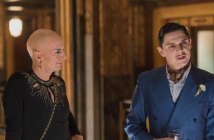April 26, 2015, 9:00 p.m. (EST), HBO
Status is a slippery thing. It is not something easily gained, nor cleanly maintained. It is not something that can be completely controlled, nor used in exactly the way we might like. Status is a crucial thing for the characters on Game of Thrones, heavily embroiled in their struggles for power and multi-layered manipulations. Those who have it want to keep or increase it. Those who lack it want to gain it. Pod wants to become a knight; Cersei wants to remain a queen. But status reflects the whims of the masses, it can change like the wind.
Look, for example, at Tyrion Lannister, who is not lying when he says he was, until quite recently, one of the richest men in the world. A few seasons back, Tyrion was also the Hand of the King. He was never beloved, but briefly, he was rich, powerful, and famous (even if he always tended to be more infamous). Now, he is functionally broke and homeless, powerless and bound to the whims of a man he used to consider an underling. Tyrion has also been scarred by his past, to the point that he is incapable of engaging in his favorite pastime: sex with a prostitute. His memories of all he has done and all he has lost cripple him, to the point that he sinks to the bottom of a bottle, running from his past, and losing enough of his wits to be captured by Jorah Mormont, who will take him to “the Queen.”
Status is also being traded on in Sansa’s storyline, where Littlefinger convinces her to avenge her family by marrying Ramsey Bolton and retaking the North. Viewers know the monster Sansa is crawling into bed with, and Littlefinger must as well. The speech he gives Sansa remains convincing, however. Petyr doesn’t tell her the whole story, because if he did, he wouldn’t get what he wanted from her. But even with all the facts on the table, he makes a good argument for why Sansa’s best option might be marrying her way back into dominance of the North. It isn’t a good option. It might even be an awful one. But Sansa’s status can still buy her another chance at the life she once lead, or at least an opportunity to inflict pain on those who have taken almost everything away from her.
Across the Narrow Sea, Arya’s status becomes a burden she must cast off to move forward. She is shackled by her past, and it keeps her from taking the next steps towards becoming a Faceless Man. To become one of the elite assassins, Arya must lose herself to the cause. Valar Dohaeris, she is reminded. All men must serve. It isn’t a lesson easily taught to a girl who, until very recently, lead a life that didn’t involve even a thought of servitude. But Arya is casting off her status in hopes of finding something more. She is trying to lose herself to gain the future she wants. Yet as determined as she is to do all that, she can’t really let go of the past entirely. She hides Needle in the rocks near the House of Black and White, a remnant of her past self she may later be able to retrieve.
Perhaps the best scene in “High Sparrow” involves a completely silent struggle for status, as Cersei and Margaery make nice with one another while shooting quiet daggers from their eyes. Cersei has held a position of power for most of her life, but now Margaery begins to effectively usurp her, taking her title, her son, and the respect of her people. Early in the episode, Margaery continues her plan of convincing Tommen to ship his mother off to Casterly Rock, but Cersei does not loose her grip on power that easily. She cannily shifts, finding a new potential ally in the High Sparrow (Jonathan Pryce, who should be in everything). Cersei has lost more of her status already than she can bring herself to admit, but she will not give up her grasp on power without a fight.
Here’s the thing about status, though. It’s elusive. It’s abstract. It’s not who we are, only who we’re seen to be. “High Sparrow” makes this point exceedingly well up at the Wall, when Jon Snow rejects the possibility of becoming Jon Stark to retain his position as Lord Commander. He explicitly rejects status, yet in how he deals with Janos Slynt, he proves he is still every bit his father’s son, the boy raised by Ned Stark to dole out harsh northern justice whether or not it earns him love. Status means different things to the people who have it and to the people who want it. It’s also transmutable, shifting depending on the point of view and the circumstances. Status is desirable and dangerous, both and end and a means. It’s what drives these characters, and, ultimately, what haunts them. What we can be is inevitably tied to what we have been, and how we are perceived is something we can only control to a limited extent. The yearning for status can make us desperate, dangerous, and conniving. But it also makes us human.
The Roundup
- “There is only one God. A girl knows his name. And all men know his gift.”
- “And he said, ‘well, what is the record? I’m sure we can break it.’”
- “You’ve been a bystander to tragedy since the day they executed your father. Stop being a bystander. Stop running. There’s no justice in the world. Not unless we make it. You loved your family. Avenge them.”
- “I’m proud to be your squire.”
- “He saved me from being a joke, from that day until his last day. And I couldn’t save him in return. Nothing’s more painful than failing to protect the one you love.”
- “I heard it was best to keep your enemies close.” “Whoever said that didn’t have many enemies.”
- “I tell them no one’s special, and they think I’m special for telling them.”
- “What will I do in my spare time?”
- SPOILERS: Sansa’s storyline goes way out of the realm of the books this week, even if in a predictable way. Marrying her off to Ramsey runs the risk of turning her misery porn into torture porn, and I very much hope the show intends to go a different way with this. I hope this will be a good thing, but I have my concerns.
Perhaps the best scene in “High Sparrow” involves a completely silent struggle for status.
-
GOOD




